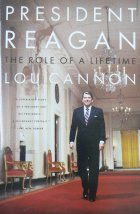 Ronald Reagan is well known as the "Great Communicator." And there has never been any doubt that he could deliver a great speech. From his rise to national prominence with a speech for Barry Goldwater in 1968 to his debate performances against George Bush and later Jimmy Carter to his oval office speeches and Presidential addresses abroad, Reagan had a clear stage presence. And he appreciated the "role" and pageantry of the office of the President. Lou Cannon, in President Reagan: The Role of a Lifetime, helps to illumine this side of Reagan, the performer, while filling out the portrait of the man himself.
Ronald Reagan is well known as the "Great Communicator." And there has never been any doubt that he could deliver a great speech. From his rise to national prominence with a speech for Barry Goldwater in 1968 to his debate performances against George Bush and later Jimmy Carter to his oval office speeches and Presidential addresses abroad, Reagan had a clear stage presence. And he appreciated the "role" and pageantry of the office of the President. Lou Cannon, in President Reagan: The Role of a Lifetime, helps to illumine this side of Reagan, the performer, while filling out the portrait of the man himself.Cannon shows that Reagan saw the presidency as a series of performances, with his staff and cabinet as his supporting cast, directors and producers. He focused on executing the duties through these performances. And there can be no doubt that this was a strength for him and a boon for his presidency. He was able to communicate great visions and ideas to the American people, and to project America's greatness abroad. But Canon makes clear that Reagan wasn't just an empty performer; he was a man with vision. He harbored an ideal of how America should be, and sought to communicate that ideal and live out the narrative of that vision in his presidency.
But, in this detailed look into Reagan's life in office, Canon notes that this vision also served as a problem for Reagan, as he often had trouble seeing realities that didn't comport with his take on how things were.
 In narrating the tale of Reagan's presidency and evaluating its success, Cannon points to a mixed legacy. In all, his first term was quite successful, powered by strong leadership from James Baker as chief of staff, while his second term was much less so, with much turn-over in his supporting cast and much less coherence and leadership from the people around him, and especially with the Iran-Contra debacle casting a shadow over the later years. Interestingly, Reagan's overall accomplishments were more in foreign policy than in domestic politics, though the latter was more Reagan's personal focus. His relationship with Gorbechev especially helped lead to many sucesses.
In narrating the tale of Reagan's presidency and evaluating its success, Cannon points to a mixed legacy. In all, his first term was quite successful, powered by strong leadership from James Baker as chief of staff, while his second term was much less so, with much turn-over in his supporting cast and much less coherence and leadership from the people around him, and especially with the Iran-Contra debacle casting a shadow over the later years. Interestingly, Reagan's overall accomplishments were more in foreign policy than in domestic politics, though the latter was more Reagan's personal focus. His relationship with Gorbechev especially helped lead to many sucesses. Cannon is a long-time Reagan watcher, covering him from his rise to prominence in California through his time in the White House, and his conclusions prove very telling, summing up well the tale he has told. He writes, "Reagan may not have been a great president, but he was a great American who held a compelling vision of his country." This detailed biography helps bring to life the inside story of the Reagan White House. I learned a great deal about events and people that I only faintly knew or remembered, and I'm confident that remembering the legacy left by leaders of the past can help shape our understanding of what is required for leadership in the future. Clearly Reagan is a man to be studied, with strengths to be learned from and many weaknesses to be avoided.
No comments:
Post a Comment